Paper Flashcards Still Rock
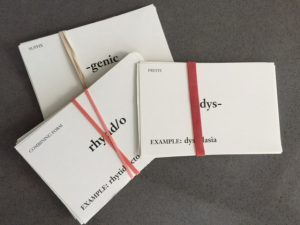
I have always been a fan of medical terminology flashcards and have used them in my classes since day one.
Before Exploring Medical Language was published with complimentary flashcards, I took time in class to teach my students how to make, organize, and use their own paper flashcards.Flashcards remain a classic study tool because they promote learning through active recall, a practice through which our brains learn most effectively.
Today it is common for medical terminology textbooks to have both complimentary electronic and paper word part flashcards. I am going to focus on paper flashcards though because I think they are cool. Students can take them wherever they go and flashcards can easily be personalized with images and color. The number of paper flashcards that accompany a textbook just for word parts can add up to more than a few, for example Exploring Medical Language comes with over 600.
So, let’s talk about how students can organize their flashcards and use them to learn in a fast and effective way. Feel free to print this information for a handout or share the link with your students.
6 Tips for Using Paper Flashcards to Learn Word Parts
The 6 tips listed here are for using paper flashcards to learn word parts, but most of the tips could be applied to create flashcards to learn all medical terms – those built from word parts and not, and abbreviations.
1. Get a nice container
Keeping your flashcards in a nice holder gives a more organized feeling and thus you are more likely to use them to study. Furthermore, when they are in a container, they are easy to transport and locate.
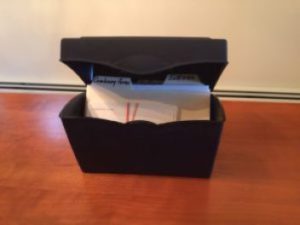
2. Group flashcards by prefixes suffixes and combining forms
Separate the flashcards for a chapter into prefixes, suffixes and combining forms. Use a simple rubber band to keep them together. As you are introduced to more prefixes and suffixes add the new flashcards to their group. Since there are so many combining form flashcards further separate them by chapter or body system. You may want to use dividers in the container to keep the cards organized.
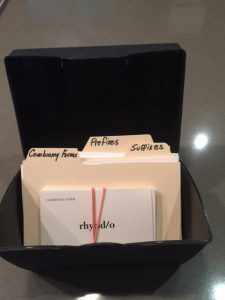
3. Personalize flashcards by drawing pictures
Add drawings to your flashcards to help you remember the word parts better. Be silly and have fun with this one. Remember to use color. As in the example below, the images are very personal and may speak to you alone.
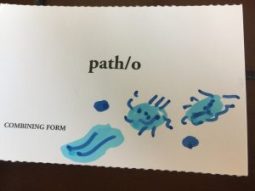
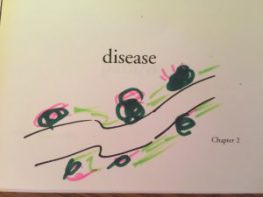
4. Speak your answers
If you are lucky enough to have a study partner you are probably saying the word parts out loud. If studying by yourself it is tempting to say them silently. Say the word part out loud if studying by yourself or with a partner.
5. Use both sides of the flashcard
Studying flashcards from both sides, the word part side and the definition side helps build strong neural pathways that can easily track the answer in both directions.
6. Create a ‘know’ pile and a ‘no’ pile
Suppose you are working with 30 new word part flashcards for the cardiovascular chapter. If you find you know the answer (you got it correct), place the flashcard on the ‘know’ pile. If you find you have not memorized the meaning of the word part yet, place the flashcard on the ‘no’ pile. Work with the ‘no’ pile until it is empty. Start over with the 30 flashcards and see how you do.
Most students do not have the time needed to learn the new language of medicine. With that in mind, I hope these tips will help you use the time you have to learn the word parts in a fast and effective way.


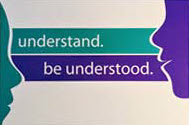

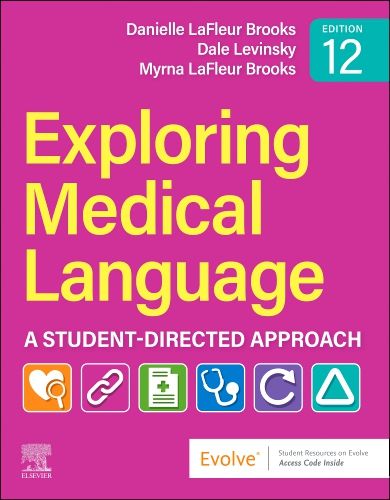
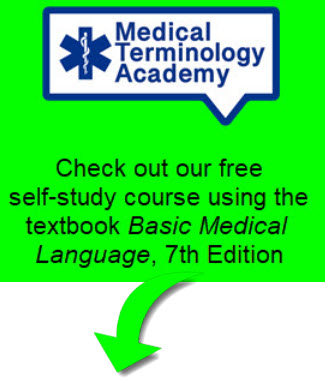
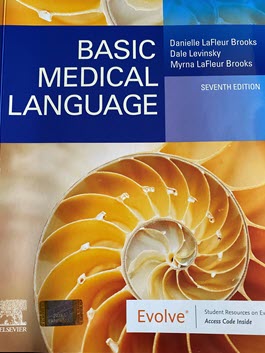
0 Responses
I recommend grouping the flashcards by chapters in the book.